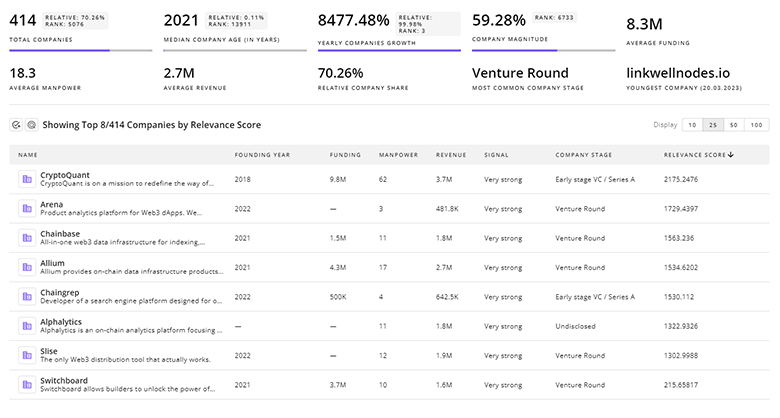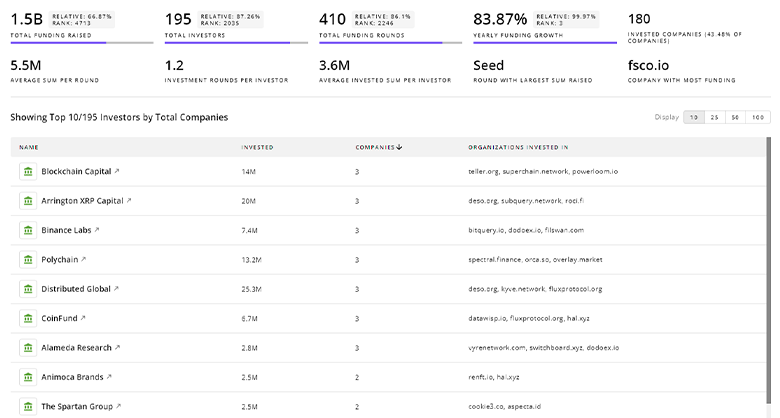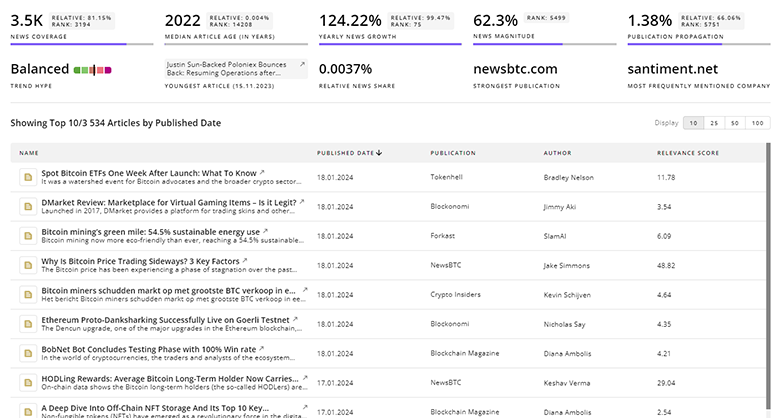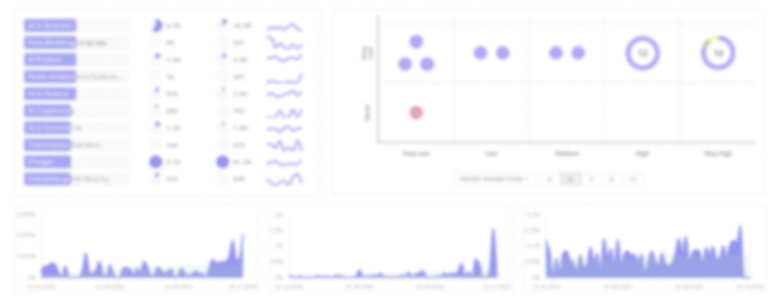
Autonomous AI Report
: Analysis on the Market, Trends, and TechnologiesThe autonomous AI landscape is advancing rapidly, combining cutting‐edge simulation, sensor fusion, and interpretable decision‐making methodologies with robust investment and patent activity. The market is marked by strong capital flows, high media interest, and diverse applications—from autonomous vehicles and drones to advanced robotics and security systems—all supported by innovative companies and breakthrough patent filings. Forward-looking trends indicate that sustained advancements in sensor technologies, reinforcement and deep learning optimizations along with distributed architectures (e.g. decentralized AI) will shape future autonomous operations.
This report was last updated 29 days ago. Spot an error or missing detail? Help us fix it by getting in touch!
Topic Dominance Index of Autonomous AI
To identify the Dominance Index of Autonomous AI in the Trend and Technology ecosystem, we look at 3 different time series: the timeline of published articles, founded companies, and global search.
Key Activities and Applications
Autonomous Vehicle Simulation and Validation:
Advanced simulation platforms like AAI ReplicaR enable virtual validation over millions of virtual miles, significantly cutting down test times. These platforms support scenario generation, real-to-sim conversion, and high-precision map editing to validate autonomous driving systems.Sensor Fusion and Decision Support in Driving:
Companies such as Phantom AI and Motor Ai are integrating deep learning with sensor fusion (e.g., cameras, LIDAR, radar) to develop autonomous driving control systems that make explainable, real-time decisions in urban traffic environments.Autonomous Drones and Robotics:
Patent activity around autonomous agents and drone control and news articles on autonomous drones (Truly autonomous AI is on the horizon) emphasize the role of autonomous solutions in aerial mobility, surveillance, and logistics.Decentralized and Edge AI Solutions:
Emerging work on distributed AI systems—exemplified by GaiaNet and decentralized approaches —indicates a shift toward secure, privacy-preserving, and monetizable AI agent frameworks that leverage blockchain and edge computing.Autonomous Software Agents and Coding:
Initiatives like ReflectionAI demonstrate the evolution of autonomous coding agents designed to automate complex, multi-step engineering tasks, enabling enhanced productivity and error reduction.
Emergent Trends and Core Insights
Funding and Investment Trends:
With companies such as Autobrains Technologies raising over a hundred millions and others like Appvance securing later-stage VC funding, significant investment underpins rapid technological innovation. There is a remarkable convergence of funding data, with the overall market poised for substantial growth over coming years as product maturity and real-world deployment advances.Patent and R&D Activity:
Numerous patent filings, such as those for intelligent awareness in autonomous vehicles and autonomous routing systems, indicate intensive research and development in autonomous AI. The technical complexity and focus on safety and reliability reflect a trajectory toward higher levels of autonomy with real-world resiliency.Scaling Simulation and Data-Centric Approaches:
Simulation platforms show significant efficiency improvements—virtual vehicles can cover distances in hours that would take traditional vehicles months. Data curation, scenario generation, and map editing tools facilitate a data-centric approach to autonomous system testing that is critical for rapid validation.Interpretable and Explainable AI:
A notable trend is the development of autonomous systems that offer transparent decision-making. Systems relying on cognitive intelligence—for example, those developed by Motor Ai —emphasize explainability and legal compliance, addressing both regulatory pressures and user trust.Emergence of Autonomous Agents and Self-Learning Systems:
News articles such as “Auto-GPT and BabyAGI” (Auto-GPT and BabyAGI) highlight a surge in the creation of autonomous agents that not only follow human commands but also set and execute goals, paving the way toward a new generation of self-sufficient AI systems.
Technologies and Methodologies
Deep Learning and Reinforcement Learning:
Foundational techniques such as deep learning and reinforcement learning remain central to enabling autonomous decision-making, as seen in both patent filings and system innovations by leading companies. These methods are further optimized with self-healing and self-learning algorithms to cover complex, dynamic environments.Sensor Fusion and Multi-Modal Data Integration:
Integrating data from multiple sensing devices (cameras, LiDAR, radar) is a critical methodology employed by companies like Phantom AI and Motor Ai. Sensor fusion methodologies improve the reliability and safety of autonomous systems by creating accurate environmental models in real time.Simulation Technologies and Digital Twins:
The use of digital twins to replicate real-world driving conditions is a prevailing methodology, as detailed by simulation platforms from Automotive AI and Autonoma. These technologies accelerate test cycles and enable comprehensive closed-loop and data-driven analysis.Decentralized Architectures and Edge Computing:
Novel approaches such as decentralized AI frameworks leverage blockchain and edge computing to distribute processing and secure data (as seen with GaiaNet). These architectures address scalability, privacy, and the need for rapid inferencing at the network edge.Explainable AI and Cognitive Architectures:
Advances in developing interpretable AI models, with systems capable of explaining their decision rationale, are emerging. Companies like Motor Ai focus on cognitive neuroscience principles to achieve explainable decision-making that can be certified under international safety standards.
Autonomous AI Funding
A total of 304 Autonomous AI companies have received funding.
Overall, Autonomous AI companies have raised $5.7B.
Companies within the Autonomous AI domain have secured capital from 1.0K funding rounds.
The chart shows the funding trendline of Autonomous AI companies over the last 5 years
Autonomous AI Companies
Autonomous AI is transforming multiple industries by integrating advanced simulation, sensor fusion, and deep learning methods with strong investment and patent backings. The market is rapidly adopting data-centric, interpretable, and decentralized AI systems that promise safer, more efficient autonomous operations. While challenges in scaling, regulatory compliance, and explainability remain, the forward-looking trajectory of technological development positions autonomous AI to significantly reshape mobility, security, and industrial automation in the near future.
Identify and analyze 877 innovators and key players in Autonomous AI more easily with this feature.

877 Autonomous AI Companies
Discover Autonomous AI Companies, their Funding, Manpower, Revenues, Stages, and much more
Autonomous AI Investors
TrendFeedr’s investors tool offers a detailed view of investment activities that align with specific trends and technologies. This tool features comprehensive data on 1.6K Autonomous AI investors, funding rounds, and investment trends, providing an overview of market dynamics.

1.6K Autonomous AI Investors
Discover Autonomous AI Investors, Funding Rounds, Invested Amounts, and Funding Growth
Autonomous AI News
Stay informed and ahead of the curve with TrendFeedr’s News feature, which provides access to 1.5K Autonomous AI articles. The tool is tailored for professionals seeking to understand the historical trajectory and current momentum of changing market trends.

1.5K Autonomous AI News Articles
Discover Latest Autonomous AI Articles, News Magnitude, Publication Propagation, Yearly Growth, and Strongest Publications













